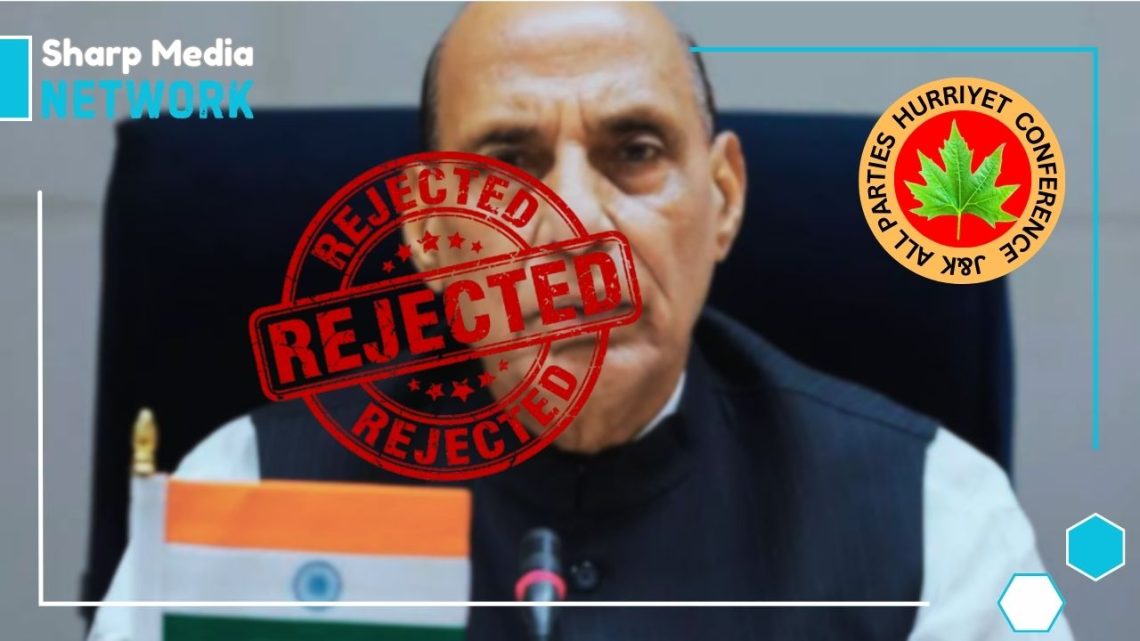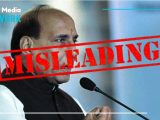
APHC Condemns India’s Defence Minister to Misrepresent Kashmir
January 15, 2025The All Parties Hurriyat Conference (APHC) has strongly denounced India’s attempts to distort the reality of Kashmir’s illegal occupation, while calling for global intervention to ensure the region’s right to self-determination.
In a forceful statement, the All Parties Hurriyat Conference (APHC) has strongly condemned India’s ongoing efforts to misrepresent Indian Illegally Occupied Jammu and Kashmir (IIOJK) as an internal matter, while concealing the harsh realities of its illegal occupation. The APHC’s remarks come in response to the recent statements made by Indian Defense Minister Rajnath Singh and other political figures, accusing Pakistan and Azad Jammu and Kashmir (AJK) of spreading misinformation.
The APHC has sharply criticized India’s ongoing propaganda campaign aimed at normalizing the situation in IIOJK. According to the APHC, these efforts include high-profile visits and misleading public statements meant to obscure the grim realities on the ground. Advocate Abdul Rashid Minhas, spokesperson for the APHC, dismissed the baseless remarks made by Indian Defense Minister Rajnath Singh about Pakistan and AJK. Minhas emphasized that such statements are an attempt to distract from the harsh conditions in IIOJK, where the people continue to suffer under India’s oppressive rule.
The Hurriyat also pointed out India’s long-standing pattern of misleading its own population about the situation in IIOJK, highlighting how Indian rulers have consistently sought to conceal the brutal realities of occupation. These attempts at misrepresentation are seen as part of a broader strategy to disempower the Kashmiri people and maintain control over the region.
In addition to Rajnath Singh’s comments, the APHC condemned recent remarks made by former Jammu and Kashmir Chief Minister Omar Abdullah, who appeared alongside Indian Prime Minister Narendra Modi in Ganderbal. The Hurriyat accused Abdullah of compromising the interests of IIOJK by aligning himself with India’s hegemonic policies. The APHC believes such actions undermine the legitimate political aspirations of the Kashmiri people and contribute to the normalization of India’s occupation.
A central concern raised by the APHC is India’s efforts to alter the demographic composition of the Muslim-majority region, a policy that has been particularly aggressive since the revocation of Article 370 in August 2019. The APHC argues that these policies are designed to disenfranchise Kashmiris and manipulate electoral outcomes in favor of India’s ruling party, further consolidating its control over the region. By implementing such authoritarian measures, India seeks to marginalize the voices of Kashmiri residents and reduce their political power.
The APHC reiterated that the Kashmir issue is fundamentally a political dispute, rooted in the Kashmiri people’s right to self-determination. The Hurriyat emphasized that the struggle for this right has persisted for over 77 years, with Kashmiris remaining unwavering in their demand for a resolution based on their political aspirations. The APHC called on the United Nations to intervene, urging the global community to press India to grant Kashmiris the inalienable right to self-determination, a right acknowledged by both India and Pakistan in international agreements.
The APHC’s condemnation of India’s propaganda efforts and political manipulation highlights the ongoing struggle for justice in IIOJK. As the region faces continued oppression, the international community, particularly the United Nations, must step in to ensure that the people of Kashmir are granted their rightful claim to self-determination, free from India’s authoritarian tactics.

